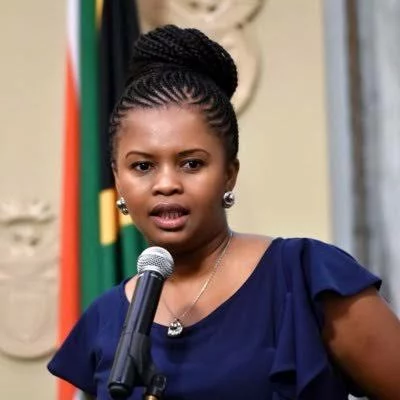The ANC has expressed concerns over the decision by Minister of Communications and Digital Technologies, Solly Malatsi, to withdraw the SABC Bill from parliament.
This after Malatsi, a DA MP, said he has informed Thoko Didiza, the Speaker of the National Assembly, about his intention to withdraw the SABC Bill.
He said the bill did not serve the long-term interests of the SABC or the public.
Khusela Diko, the chair of the portfolio committee on communications and digital technologies and an ANC MP, clarified that Malatsi has not yet formally informed the committee of his decision as per the requirements of parliament.
Diko acknowledged that Malatsi has the authority to withdraw the bill before its second reading but argues that this could have severe consequences for the future of the SABC.
She stated that the bill aimed to address key issues facing the SABC and has already been through extensive public consultation and parliamentary hearings.
She insisted that Malatsi’s decision to withdraw the bill is based on his belief that it is totally flawed when concerning the public broadcaster’s funding model and the powers it gives the minister to appoint board members.
Bill first proposed in 2023
Diko highlighted that the SABC is facing critical financial and governance challenges that demand urgent attention and warned that the withdrawal of the bill would delay necessary reforms and disrupt the progress already made.
She claimed that the government first proposed the bill in 2023 with the intention of ensuring the SABC’s continued existence and enhancing its governance.
“To this end, the government and even the committee itself had initiated various engagements with stakeholders on the possible funding model for the public mandate of the SABC — the most substantive and urgent of the concerns raised against the bill,” Diko said.
Matthew Parks, the Cosatu parliamentary coordinator, also raised eyebrows at the withdrawal of the SABC Bill.
He stated that this sends a concerning message about the government’s trust in the bills it puts forward in parliament.
He was worried that if the executive lacks confidence in its own legislation, it could undermine parliament’s and society’s trust in the process.
Frameworks for revised bill
“We welcomed provisions in the bill affirming the public ownership and mandate of the SABC as well as its developmental role,” Parks said.
“We had also welcomed provisions limiting the ability of a minister to interfere in the running of the SABC or its editorial and news content.
“If the minister has proposals to strengthen the SABC legislation to ensure its financial sustainability and protection from political interference, we will welcome that in principle.
“It is urgent that the minister indicate timeframes for a new or revised bill.”
He said the deadlines are crucial because the SABC is in a difficult situation and cannot afford to keep facing delays and uncertainty.
Tsholofelo Bodlani, the DA MP, commended Malatsi for withdrawing the bill, saying this showed that he was giving up executive powers that could have interfered with the SABC.
Bodlani said from its introduction in the 6th administration to its revival in the current one, the DA, together with civil organisations, has consistently opposed the bill due to its failure to address the SABC’s immediate concerns.
The party waits to hear from Malatsi about the next steps for the SABC’s financial model, which is considered an urgent priority.
Financial loss expected for 2024/25
“In the myriad challenges the public broadcaster faces, the bill was significantly counterproductive,” said Bodlani.
“It sought to provide further powers to the executive over the SABC’s operations and finances, jeopardising its independence and going against constitutional precedent.
“The SABC expects to incur a R590-million financial loss for 2024/25, from a R1.1-billion loss in 2023/24.
“It has received its first clean audit in over a decade, after a bruising history of state capture.”
The disagreement between the ANC and DA demonstrates deep divisions over the policy direction of the country. The parties form part of the government of national unity (GNU)
When President Cyril Ramaphosa signed the Basic Education Laws Amendment into law recently, Siviwe Gwarube, the Minister of Basic Education and a DA MP, boycotted the ceremony, making it clear that there were policy divisions within the GNU.



